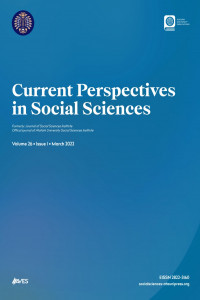Steven Berkoff Tiyatrosu ve Sink the Belgrano!
Steven Berkoff, İngiliz tiyatrosunun yaşayan efsanelerinden biridir. Yaşamının büyük bölümünü sahnede geçiren Berkoff, çok sayıda tiyatro oyununda yazarlık, yönetmenlik ve oyunculuk yapmış, A Clockwork Orange (1971), Rambo (1985) ve Underworld (1985) gibi birçok tanınmış filmde rol almıştır. Çok yönlü uluslararası kariyerine rağmen, Steven Berkoff hakkında az sayıda akademik çalışma bulunmaktadır. Bu makalenin amacı, Berkoff'un genellikle “Berkovian estetiği” olarak adlandırılan tiyatro anlayışının temel özelliklerini aktarmak ve onun Sink the Belgrano! (1986) adlı oyunun siyasi bir okumasını sunmaktır. 1982 yılında İngiltere ile Arjantin arasında meydana gelen Falklands Savaşı’nı konu alan oyun, özellikle Margaret Thatcher ve onun savaş kabinesinin aldığı tartışmalı bir kararla batırılan Arjantin Donanması’na ait hafif kruvazörü General Belgrano’nun trajik öyküsünü aktarır. Oyun aynı zamanda Berkoff'un çeşitli deneysel dramatik teknikleri bir araya getirme eğiliminin en iyi örneklerinden birini sunar. İki bölümden oluşan bu çalışmada Berkoff’un tiyatro anlayışının başat özellikleri vurguladıktan sonra yazarın en önemli oyunlarından biri olan Sink the Belgrano’nun ayrıntılı bir incelemesi sunulur.
Anahtar Kelimeler:
Savaş Tiyatrosu, Steven Berkoff, İngiliz Tiyatrosu, Falklands Savaşı, Siyasi Hiciv
The Theatre of Steven Berkoff and Sink the Belgrano!
Abstract: Steven Berkoff is one of the living legends of British theatre. He has spent most of his adult life on stage. He has written, directed and acted in numerous plays. He has also appeared in many well-known movies, such as A Clockwork Orange (1971), Rambo (1985) and Underworld (1985). In spite of his multifaceted international career, little scholarly research has been conducted on Steven Berkoff’s art. The aim of this paper is to outline the key characteristics of Berkoff’s conception of theatre, usually referred to as Berkovian aesthetic, and present a political reading of his celebrated play, Sink the Belgrano! (1986). The play deals with The Falklands War between England and Argentina, particularly focusing on the events that led to the sinking of the Argentinian Navy light cruiser The General Belgrano by the British nuclear submarine HMS Conqueror. The play also reflects Berkoff’s tendency to bring together various experimental dramatic techniques. The present paper firstly highlights the key characteristics of Bekovian aesthetic and then presents a comprehensive analysis of Sink the Belgrano! as one of Berkoff’s quintessential plays.
Keywords:
Drama, Steven Berkoff, the Falklands War, British Drama, Political Satire Drama, Steven Berkoff, the Falklands War, British Drama, Political Satire,
___
- Berkoff, S. (1978). “Three theatre manifestos.” Gambit. Vol. 8 No: 32, 7-21.
- Berkoff, S. (1987). Sink the Belgrano. London: Faber and Faber.
- Berkoff, S. (1992). Theatre of Steven Berkoff. London: Methuen Drama.
- Berkoff, S. (1996). Free association: An autobiography. London: Faber and Faber.
- Freedman, L. (2005). The official history of the Falklands campaign: Vol. II War and Diplomacy. Routledge: London.
- Monaghan, D. (1998). The Falklands War: myth and countermyth. New York: Macmillan. Rosen, C. (2000) “Creating the ‘Berkovian’ Aesthetic: An analysis of Steven Berkoff's performance style” Retrieved from: http://www.iainfisher.com/berkoff/berkoff-dissertation-aesthetic.html
- “Steven Berkoff: His life and times” The Guardian Achieves. (2001). Retrieved from: https://www.theguardian.com/uk/2001/aug/23/edinburghfestival2001.edinburgh
- Thatcher, M. (1993). Downing Street years. New York: Harper Collins.
- Young, H. (1991). One of us. London: Macmillan.
- Başlangıç: 2003
- Yayıncı: Atatürk Üniversitesi
Sayıdaki Diğer Makaleler
Kate Chopin’in “Saygın Bir Kadın” Adlı Kısa Hikayesinde Freudyen Bir Tekinsizlik
Doğalgaz Kullanım Tercihinde Etkili Olan Sosyo-Ekonomik Faktörlerin Analizi: Rize Örneği
“İklim Değişikliğinde Yeşil Adımlar” TÜBİTAK 4004 Proje Değerlendirilmesi
Aslıhan ESRİNGÜ, Nurtaç CANPOLAT, Özlem BARIŞ
Bir Caddenin Oluşum Evreleri: Erzurum Cumhuriyet Caddesi
Gastronomi Turizmi Kapsamında Türkiye Peynir Çeşitliliği Haritası
Emre HASTAOĞLU, Melda ERDOĞAN, Mustafa IŞKIN
Bir Yükseköğretim Kurumunda Örgütsel Gücün Etik İklim ve Etik Liderlik ile İlişkisi
Burcu YOĞURTCU, Semra K GÜNGÖR
The Effectiveness of Health Management in Schools Scale (EHMSS): A Validity and Reliability Study
